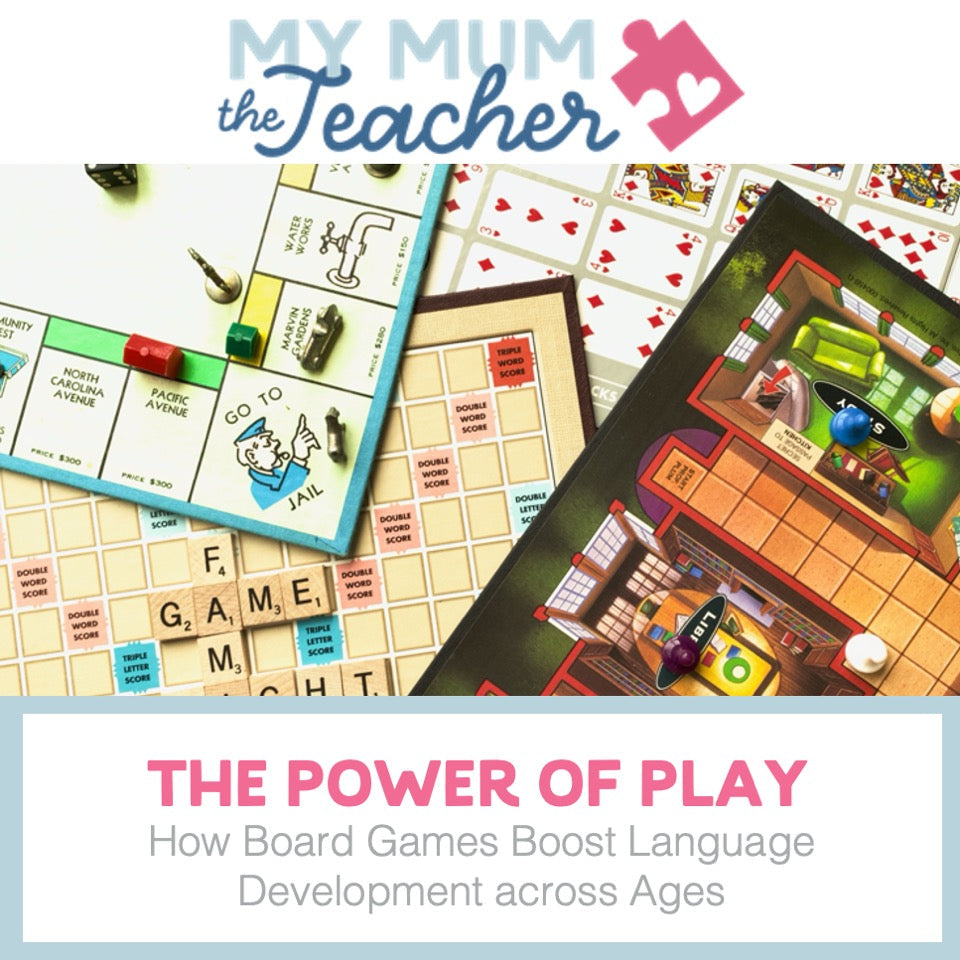
The Power of Play: How Board Games Boost Language Development Across Ages
Share
Board games are more than just a source of entertainment; they are powerful tools that can significantly enhance language development. By engaging in gameplay, children and adolescents can improve their vocabulary, comprehension, and communication skills. Here's how board games can benefit language development across different age groups, along with recommended games.
Some of the links in this blog post are affiliate links, which means My Mum, the Teacher may earn a small commission if you make a purchase through them - at no additional cost to you. These commissions help support the ongoing creation of free, high-quality resources for educators and families. We only recommend products we genuinely believe in and feel will benefit our readers. Thank you for your support!
Literacy is more than just reading words on a page—it's about understanding, interpreting, and using language effectively in everyday life. While traditional instruction is vital, incorporating games into the mix can make literacy development both meaningful and memorable. Board and card games are a powerful way to enhance vocabulary, improve expressive and receptive language skills, and build reading comprehension—without students even realising they're learning.
Some of my favourite games for boosting literacy include Cluedo!, Uno, Spot It, Scattergories, and Tapple (a modern version of the fast-paced game I knew as Panic growing up). Each of these games targets different language and literacy skills in fun, accessible ways:
- Cluedo! supports inference-making, questioning, and oral expression as players piece together clues and justify their guesses.
- Uno encourages turn-taking and colour/number recognition, while also requiring players to read and respond to action cards.
- Spot It hones visual discrimination, rapid word recall, and vocabulary development. There are lots of different options in this game, for younger players and those with a particular interest (Harry Potter, Marvel etc.).
- Scattergories is a personal and family favourite! Whenever my relatives visit, this game comes out! Not only does it strengthen word retrieval, category knowledge, and creative thinking under pressure, it is also good for a really good laugh! You'll be surprised at the responses your children come up with.
- Tapple promotes quick thinking, phonemic awareness, and rapid verbal expression—perfect for expanding vocabulary and oral fluency.
These games are excellent tools for building both expressive language (speaking, describing, reasoning) and receptive language (listening, processing instructions, interpreting meaning), while also supporting reading fluency, word recognition, and even spelling.
Whether you're playing at home as a family or integrating games into classroom routines, the value of play in literacy development can't be overstated. In this blog, we’ll explore a range of engaging games that promote language-rich experiences for learners of all ages—because building strong literacy skills should be as joyful as it is educational.
Ages 2–5: Building Early Language Foundations
For young children, play is a primary mode of learning. Board games for this age group should focus on:
- Vocabulary Expansion: Introducing new words in context.
- Listening Skills: Following simple instructions.
- Turn-Taking: Developing conversational skills.
- Phonemic Awareness: Recognising and manipulating sounds.
Recommended Games:
-
Orchard Toys – Match and Spell
This game helps children recognise letters and build simple words, enhancing early reading skills. -
Boggle Junior
A simplified version of the classic game, it aids in letter recognition and word formation. -
Skillmatics Guess in 10 Junior: Animals
Encourages children to ask questions and build vocabulary related to animals. -
Coogam See Spelling Learning Toy
Combines flashcards and wooden letters to teach spelling and word recognition. -
LeapFrog Learning Friends 100 Words Book
An interactive book that introduces children to 100 essential words with sound effects.
Ages 6–10: Enhancing Vocabulary and Comprehension
As children grow, their language skills become more sophisticated. Board games for this age group should focus on:
- Advanced Vocabulary: Introducing complex words.
- Reading Comprehension: Understanding game instructions and narratives.
- Strategic Thinking: Planning and decision-making.
- Social Interaction: Engaging in discussions and negotiations.
Recommended Games:
-
Scrabble Junior
A two-sided board game that grows with your child, starting with matching letters and progressing to forming words. -
Skillmatics Rapid Rumble
A fast-paced game that challenges players to think quickly and expand their vocabulary. -
Outfoxed!
A cooperative whodunit game that enhances deductive reasoning and vocabulary. -
Osmo Genius Starter Kit for iPad
Combines physical game pieces with digital gameplay to teach spelling, vocabulary, and problem-solving. -
Orchard Toys – Shopping List
Helps children improve memory and word recognition as they match items on their shopping list.
Ages 11+: Refining Language and Critical Thinking
For older children and teenagers, board games can serve as tools for:
- Advanced Language Skills: Enhancing vocabulary and comprehension.
- Critical Thinking: Developing reasoning and analytical skills.
- Debate and Persuasion: Encouraging articulate expression of ideas.
- Teamwork and Negotiation: Fostering collaborative communication.
Recommended Games:
-
Scrabble
The classic word game that challenges players to create words for maximum points. -
Boggle
A fast-paced game that improves word recognition and vocabulary under time constraints. -
Upwords
A 3D word game where players build words upwards, enhancing spatial and linguistic skills. -
Cluedo
A mystery game that develops deductive reasoning and narrative skills. -
The World Game – Geography Card Game
Combines geography knowledge with language skills as players learn about countries and capitals.
Incorporating board games into your child's routine can significantly enhance their language development. These games provide a fun and interactive way to build vocabulary, improve comprehension, and foster communication skills. Whether at home or in the classroom, board games are valuable tools for learning through play.
Note: Always ensure that the games are developmentally-appropriate and align with your child's interests, strengths and learning needs.








